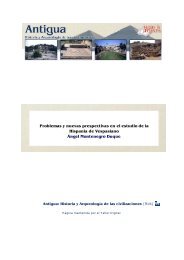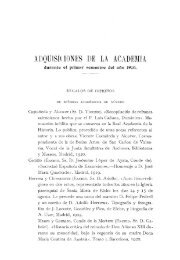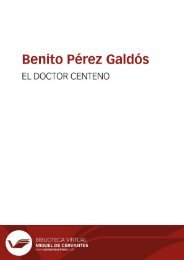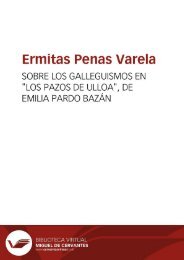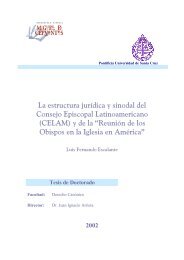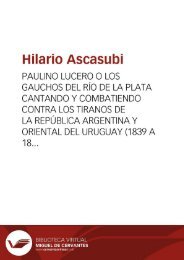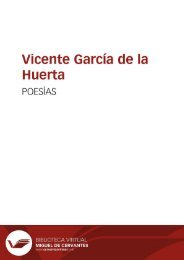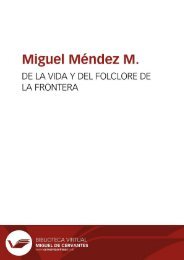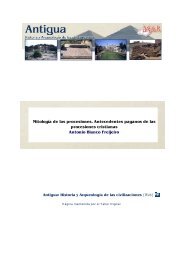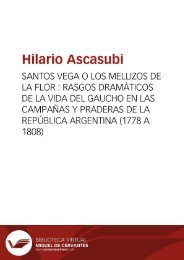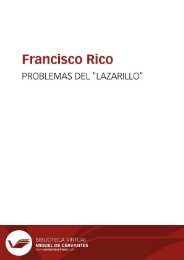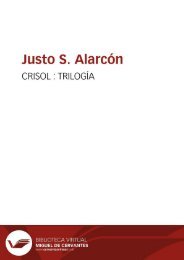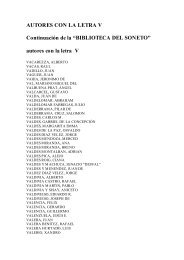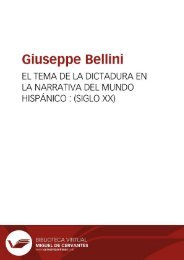Create successful ePaper yourself
Turn your PDF publications into a flip-book with our unique Google optimized e-Paper software.
II<br />
Anales galdosianos [Publicaciones periódicas]. Año XII, 1977<br />
Various critics have expressed what they believe is the novel's commentary on social values, or<br />
its presentation of Spain's historical situation. Gonzalo Sobejano 84 , for instance, sees the novel's «<br />
formas literarias », i. e., monologues and soliloquies, as « formas de sensibilidad social » (p. 105),<br />
i. e., « la soledad el secreto, la desconfianza » (p. 103) of bourgeoise society. Joaquín Casalduero<br />
85 considers the novel to be a presentation of « las ideas históricas de <strong>Galdós</strong> sobre España » (p.<br />
394): Viera is « la España tradicional en lucha con el Tiempo » that « se ve vencida y obligada<br />
a desaparecer si no quiere terminar en la ignominia », while Orozco is « la nueva conciencia, el<br />
hombre nuevo » (p. 396). Since Realidad is <strong>Galdós</strong>' «literary approximation to the complexity<br />
of reality itself» (Penuel, «The Ambiguity of Orozco's Virtue...», p. 417), both of these views can,<br />
within a Cervantine perspectivism, be admitted. The present analysis, however, directs us toward an<br />
interpretation of this work which has not previously been expounded.<br />
Infante, in one of his letters to Equis, makes this statement apropos of the question of Orozco's virtue:<br />
No niego que pueda existir en nuestros tiempos la santidad; pero me resisto a admitirla en las altas<br />
clases. Existirá en las Ordenes religiosas, o en los desiertos habitados por una sola persona; pero en<br />
el mundo activo, en la sociedad, en el matrimonio, en medio de los chismes, de las envidias, de la<br />
soberbia, del lujo... Vamos, Equisillo, que se te quite eso de la cabeza.<br />
(p. 778)<br />
This statement might be counted as just one more example of Infante's unreliability, because, as<br />
we have already seen, it certainly does not represent <strong>Galdós</strong>' own religious thinking. It is tempting,<br />
though, to see this statement as the proposition which <strong>Galdós</strong> systematically sets out to disprove<br />
in Realidad and in succeeding novels, where, by playing with reality and illusion, he explores and<br />
represents « la santidad » in different social classes and in varying degrees and shades. <strong>Galdós</strong><br />
does not completely and satisfactorily disprove this proposition until Misericordia . As Robert H.<br />
84 « Forma literaria y sensibilidad social en La incógnita y Realidad », RHM, 30 (1964), 89-107.<br />
85 « Ana Karénina y Realidad », BH , 39 (1937), 375-396, rpt. in his Estudios de literatura española ,<br />
2nd ed. (Madrid: Gredos, 1967), pp. 179-201.<br />
57




